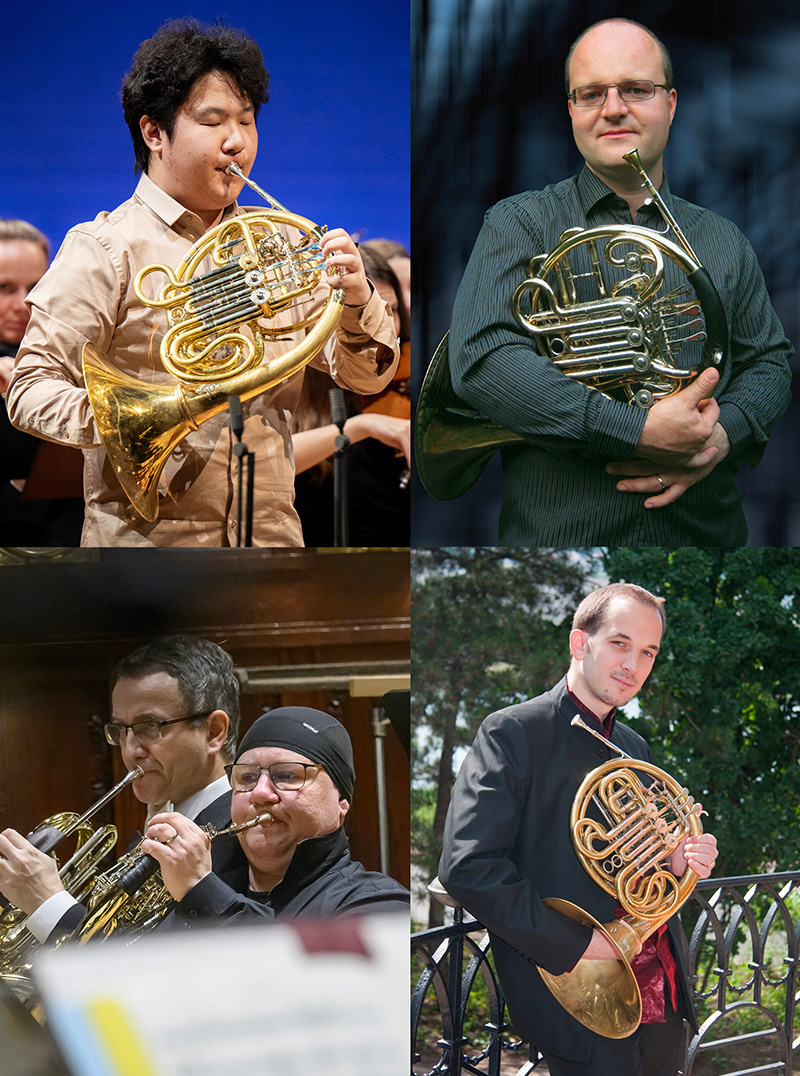Four Horns with Orchestra
Programme
- Carl Maria von Weber: Der Freischütz, overture
- Robert Schumann: Konzertstück for Four Horns and Orchestra Op. 86
- Pyotr Ilyich Tchaikovsky: Symphony No. 4 in F minor Op. 36
Performers
- Prague Symphony Orchestra
- Robert Jindra – conductor
- Zhicheng Jin – French horn
- Zuzana Rzounková – French horn
- Jan Vobořil – French horn
- Szabolcs Zempléni – French horn
There are many compositions in existence for chamber ensemble and orchestra, nevertheless, the number of those written for four French horns could be counted on the fingers of one hand. One of the authors who ventured into this unexplored territory was the German composer Robert Schumann (1810–1856). The last time the Prague Spring programmed his Konzertstück for Four Horns and Orchestra was back in 1992. On that occasion the soloists included the legendary brothers Zdeněk and Bedřich Tylšar. At the festival in 2025 the solo parts will be performed by two laureates of the Prague Spring competition – Jan Vobořil, today solo horn in the Czech Philharmonic, and the winner from 2024, Chinese horn player Zhicheng Jin. Making up the foursome will be solo horn in the Prague Symphony Orchestra Zuzana Rzounková, and winner of the ARD competition in Munich, Szabolcs Zempléni. The concert will open with the popular overture from the opera Der Freischütz by Carl Maria von Weber (1786–1826). In the second half you will hear Symphony No. 4 by Peter Ilyich Tchaikovsky (1840–1893), a masterful work which makes full use of all the sounds and expressions that a symphony orchestra is capable of. The Prague Spring entrusted its performance to the Prague Symphony Orchestra, led by excellent Czech conductor and music director at Prague’s National Theatre Opera, Robert Jindra, who makes guest appearances at the most prestigious opera venues, including the Bavarian State Opera in Munich and the Berlin State Opera.

It wasn’t only Ludwig van Beethoven, Richard Strauss and Fryderyk Chopin who sought to treat their ailing health in the hospitable environment of the Czech spa, but also Carl Maria von Weber; in the spring of 1814, during his tenure as director of the Royal Theatre of the Estates in Prague, today’s Estates Theatre, he became seriously ill and spent the summer holidays convalescing at the Libverda spa in North Bohemia. It was this natural setting that apparently inspired him to write his best known opera Der Freischütz (The Freeshooter), whose celebrated overture will be performed at the Prague Spring. The overture outlines the plot of the entire opera and, despite the occasional use of the “demonic diminished seventh chord”, symbolising the character of Samiel, the Black Huntsman, it ultimately brings the story to a happy conclusion, in which love triumphs over dark forces.
Robert Schumann described his Konzertstück for Four Horns and Orchestra as “something quite curious”. And indeed it is: during its time this concertante piece for four French horns and orchestra was tantamount to sheer experimentation, or utter lunacy. To this day the piece is known among hornists for its extreme difficulty and, due to the high demands placed on all four solo players, it is performed only on exceptional occasions. Schumann sketched the work within a mere three days in February 1849 and surviving correspondence tells us that he considered it to be one of his best compositions. Its public premiere was held in the Leipzig Gewandhaus a year later, on 25 February 1850, conducted by Julius Rietz. The 20-minute piece, which begins with an impressive fanfare in the four horns, is appealing both for its polished style and form, revealing Schumann’s admiration for the 18th century Classical masters, and for its temperament, which throws the door to Romanticism wide open.

“None of my previous orchestral works ever cost me such labour, yet I have never felt such a love for one of my own pieces,” wrote Peter Ilyich Tchaikovsky to his friend Nadezhda von Meck in December of 1877. His work absorbed him and exhausted him in equal measure. “Perhaps I am mistaken, but I think that this symphony is something out of the ordinary, and that it is the best thing I have done so far […] Now I […] can wholly devote myself to work in the knowledge that I am bringing forth something which, in my opinion, shall not be forgotten…” The composer wrote the work during what was a difficult time for him: as a homosexual, he was facing inexorable social pressure and, for appearance’s sake, he entered into a disastrous marriage. His state of mind is best reflected in another letter to Nadezhda von Meck, in which he refers to one of the themes in his symphony: “This is Fate: this is that fateful force which prevents the impulse to happiness from attaining its goal […] It is an invincible force that can never be overcome – merely endured, hopelessly. Is it not better to escape from reality and to immerse oneself in dreams?” Just the opening brass fanfares alone suggest to us that the Fourth Symphony is a work plunging the very depths of the human soul, conveyed to us in the exquisite theme of the second movement, then in the enchanting pizzicato Scherzo, which conjures up an image of a Russian troika dashing across the snow-covered plains, before we arrive at the monumental finale. The concert in Municipal House on 21 May will be borne on a wave of Romanticism and profound emotion.








